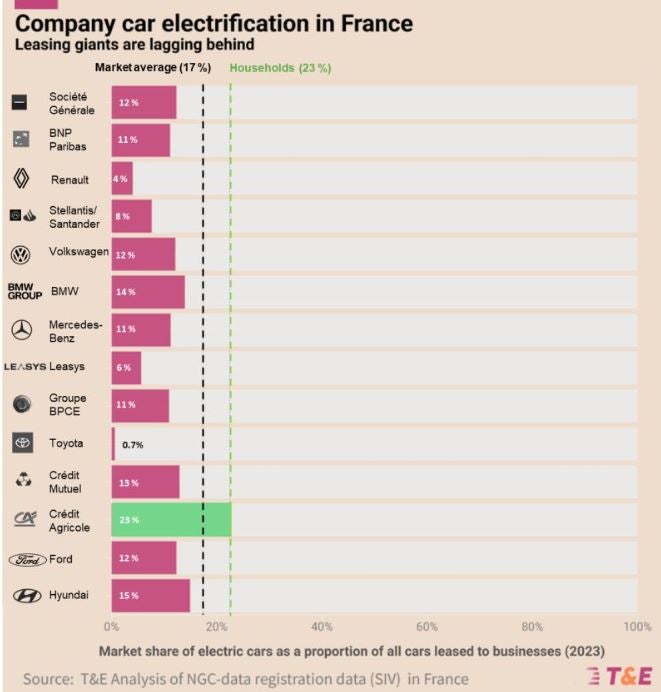French households are at the forefront of the transition to electric cars, outpacing BNP and Société Générale leasing companies, which have been responsible for introducing many large polluting SUVs onto French roads. These findings are from a recent Transport & Environment (T&E) report released prior to Société Générale’s annual general meeting of shareholders on May 22.
Leading French banks such as Société Générale, BNP Paribas, BPCE, Crédit Mutuel, and Crédit Agricole have car leasing subsidiaries that acquire and lease tens of thousands of new cars annually. These companies register half of the new cars in France each year, with 63% of them being owned by leasing companies, translating to nearly one in three new cars being leased to businesses.

However, T&E’s analysis indicates that Société Générale and BNP Paribas are trailing in the shift toward electric vehicles (EVs). In 2023, only 12% of the 93,000 cars leased to professional fleets by Société Générale’s subsidiaries were electric, below the national market average of 17% and the household average of 23%. BNP Paribas performed even worse, with only 11% of its 80,000 leased cars being electric.
Among these leasing companies, only Crédit Agricole surpassed the market average, with 23% of its 14,000 leased cars being electric, showcasing that rapid electrification is achievable with the right approach. T&E calls on other market players to emulate this example. Additionally, BNP and Société Générale are contributing to pollution by leasing a significant number of large SUVs, which are four times more prevalent in their fleets than in households.
While companies determine which cars to lease, major leasing companies are not impartial intermediaries. They wield substantial market power, ordering tens of thousands of cars yearly and influencing manufacturers’ production strategies. T&E’s research reveals that leasing companies often overprice electric cars and recommend clients opt for petrol or hybrid models.
This practice has adverse effects on the used car market, as leased cars are typically resold after three to four years. By delaying the transition to new electric vehicles, leasing companies also impede the availability of more affordable second-hand electric cars.
Despite claims of leadership in green mobility, reports suggest that leasing companies are impeding the automotive transition. The sector has even opposed legal mandates for electrifying professional fleets, although their appeal was dismissed by the Council of State in October 2023. Presently, they are advocating for political amendments to circumvent these mandates.
T&E is urging banks and their leasing subsidiaries to take accountability and move away from petrol-driven cars. Public policymakers must scrutinize this crucial sector and ensure it supports the transition to electric vehicles, the clean energy NGO emphasized.
Leasing giants urged to spearhead green transition: T&E
Transport emissions predicted to dominate Europe’s GHG output by 2030: T&E
FAQs
1. How are French households leading the transition to electric cars?
French households are at the forefront of the transition to electric cars by outpacing major leasing companies like BNP and Société Générale in adopting electric vehicles.
2. What is the role of major French banks in the car leasing industry?
Leading French banks have car leasing subsidiaries that acquire and lease tens of thousands of new cars annually, with a significant portion of the new cars in France being owned by leasing companies.
Conclusion
The analysis by Transport & Environment highlights the need for major leasing companies to accelerate the transition to electric vehicles and reduce their reliance on petrol-driven cars. It is imperative for the sector to align with the shift towards clean energy and support the widespread adoption of electric vehicles to mitigate environmental impact.

















